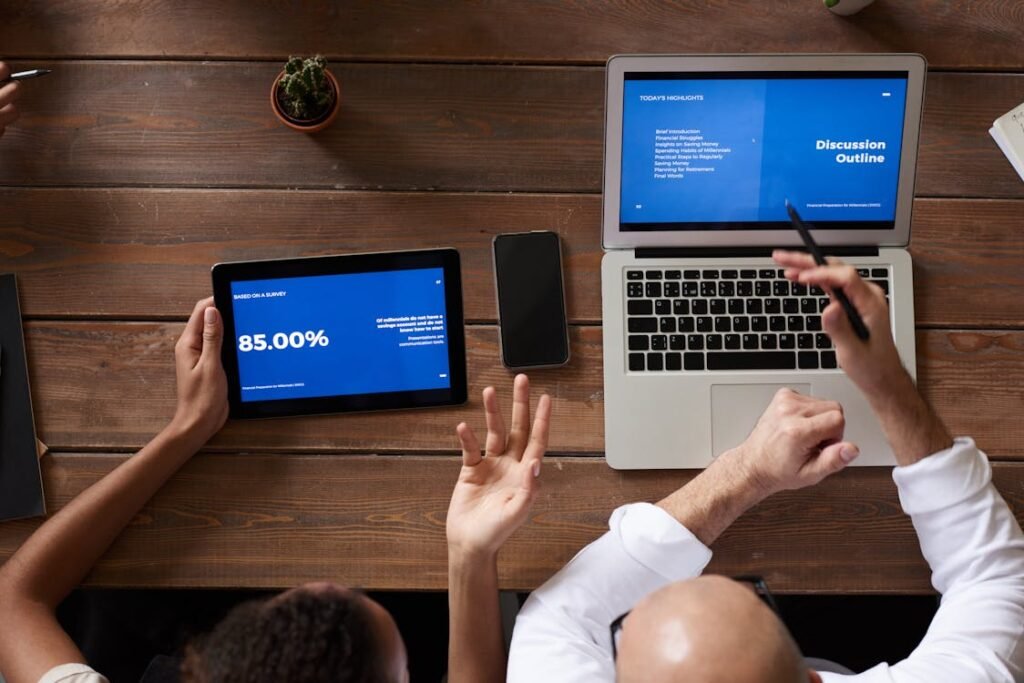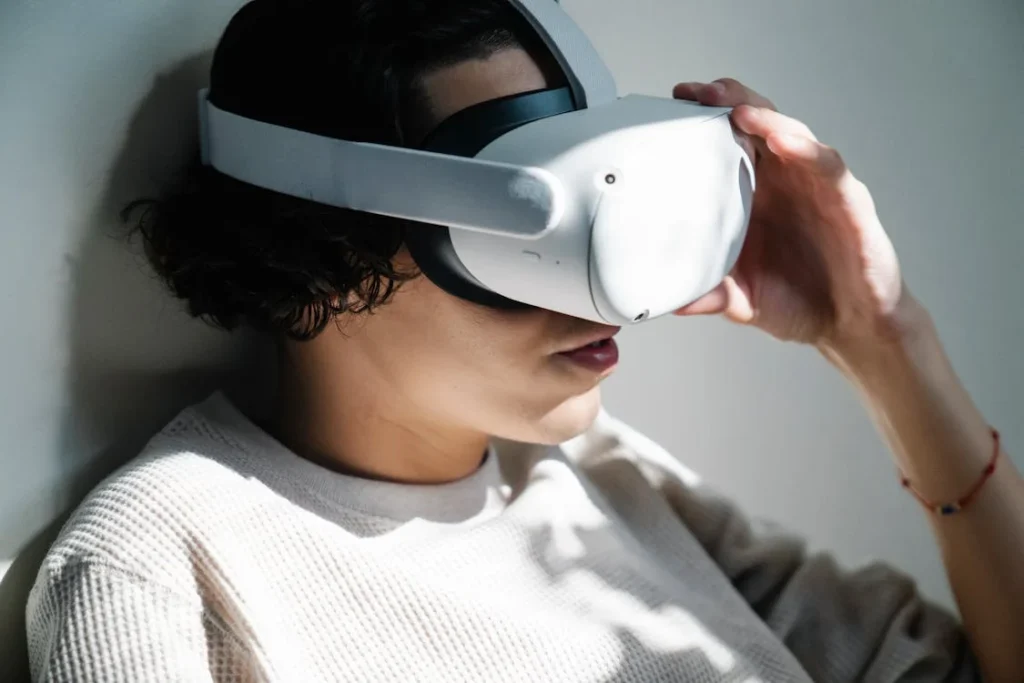Workplace accessibility and disability inclusion in India have come a long way, but there is still much work to be done. Companies are beginning to realize that creating an inclusive environment is not just a legal obligation—it is a step toward building a diverse, innovative, and highly productive workforce. As technology advances and societal attitudes shift, businesses are exploring new ways to ensure equal opportunities for employees with disabilities.
The future of accessibility is not just about ramps and accessible washrooms. It is about integrating assistive technologies, improving hiring policies, and fostering a culture where employees with disabilities feel valued and empowered. From artificial intelligence to flexible work policies, many exciting trends are shaping the future of workplace inclusion in India.

The Role of Technology in Shaping Workplace Accessibility
Advancements in Assistive Technology
Technology is playing a major role in transforming workplace accessibility for employees with disabilities in India.
As businesses move toward a digital-first approach, assistive technologies are becoming essential tools that enable disabled employees to perform their tasks with greater efficiency and independence.
Innovations such as screen readers, speech-to-text software, and voice-controlled applications are making it easier for employees with visual, hearing, or mobility impairments to navigate digital workspaces.
Prosthetic advancements are also revolutionizing workplace accessibility. Modern bionic limbs, like those developed by Robobionics, are designed to offer greater functionality and comfort, allowing employees to perform tasks that once seemed impossible.
The integration of sensory feedback in prosthetic hands is making it easier for users to engage in fine motor activities, which opens up opportunities in fields that require precision and dexterity.
Artificial intelligence is further expanding accessibility by automating routine tasks and reducing the need for manual input. AI-driven transcription services enable employees with hearing impairments to participate in meetings with real-time captioning.
Smart assistants powered by AI are helping individuals with mobility limitations control their work environments, from adjusting screen brightness to composing emails using voice commands.
The Rise of Remote and Hybrid Work Models
The COVID-19 pandemic significantly changed the way companies view remote work. While many businesses initially saw work-from-home as a temporary solution, it has now become a standard practice in various industries.
This shift has created new opportunities for employees with disabilities, removing physical barriers that previously limited their access to jobs.
Remote work offers disabled employees greater flexibility in managing their work environment. They can set up their workspace to meet their specific needs without relying on office infrastructure that may not be fully accessible.
Additionally, working from home reduces the challenges associated with commuting, which is often a major hurdle for individuals with mobility impairments due to the lack of accessible public transport in India.
Hybrid work models are also gaining popularity, allowing employees to balance in-office and remote work. This model benefits disabled employees by giving them the option to visit the office when necessary while still having the flexibility to work from home.
Companies that implement inclusive hybrid policies are more likely to attract and retain disabled talent, as they demonstrate a commitment to accommodating diverse needs.
Digital Accessibility in the Workplace
As companies continue their digital transformation, ensuring accessibility in virtual workspaces is becoming a priority. Many businesses in India are now focusing on making their internal software, websites, and communication tools fully accessible.
This involves designing platforms that are compatible with assistive technologies, using clear and readable fonts, and providing alternative text for images so that visually impaired employees can navigate digital content with ease.
Training employees on digital accessibility is another emerging trend. Companies are beginning to educate their staff on how to create accessible documents, presentations, and emails.
By embedding accessibility into daily work processes, businesses are fostering an environment where inclusivity is not just a policy but a natural part of workplace culture.

The Shift Toward Inclusive Hiring Practices
Breaking Stereotypes in Recruitment
One of the biggest challenges disabled job seekers in India face is the perception that they are less capable than their non-disabled peers.
Many companies still hesitate to hire employees with disabilities due to outdated stereotypes and a lack of awareness about workplace accommodations. However, this mindset is gradually changing as businesses recognize the benefits of a diverse workforce.
Inclusive hiring is becoming a key focus for many forward-thinking companies. Organizations are beginning to see that employees with disabilities bring unique problem-solving skills, adaptability, and resilience to the workplace.
Businesses that actively recruit disabled talent are not just meeting diversity goals—they are gaining employees who offer fresh perspectives and innovative solutions.
HR departments are now revising their recruitment processes to ensure accessibility. This includes providing job descriptions in accessible formats, allowing for alternative application methods, and ensuring interview locations are wheelchair-friendly.
Many companies are also implementing inclusive hiring policies, where candidates are evaluated solely on their skills and experience rather than their physical abilities.
The Growth of Skill-Based Hiring
A major trend in recruitment is the shift from degree-based hiring to skill-based hiring. Many businesses are moving away from strict educational requirements and instead focusing on practical skills and work experience.
This change benefits disabled job seekers, as it opens doors to opportunities that were previously limited by rigid academic qualifications.
With online learning platforms and certification programs becoming more accessible, disabled professionals now have more ways to gain industry-relevant skills.
Many companies are also investing in training programs to help disabled employees upskill and transition into new roles. This emphasis on skills over formal education is breaking down barriers and allowing more individuals with disabilities to find meaningful employment.
The Role of Disability Employment Programs
Several government and private-sector initiatives are driving disability inclusion in recruitment. The Rights of Persons with Disabilities (RPWD) Act, 2016, mandates that companies with more than 20 employees provide equal opportunities for disabled workers.
In response, many businesses have introduced dedicated employment programs to hire and support disabled employees.
Companies are collaborating with disability organizations to connect with potential candidates and create work environments that support their needs.
Job fairs and career expos specifically for disabled professionals are becoming more common, helping bridge the gap between employers and job seekers.
Businesses that actively participate in these initiatives are not only fulfilling their legal obligations but also strengthening their brand as inclusive and socially responsible organizations.

The Future of Workplace Policies and Legal Protections
Strengthening Workplace Policies for Inclusion
As India moves toward a more inclusive workforce, companies are revising their workplace policies to align with global standards on accessibility and disability rights.
While many businesses have diversity and inclusion statements, real change comes from implementing structured policies that ensure equal opportunities for disabled employees.
One of the emerging trends is the development of detailed Equal Opportunity Policies that outline a company’s commitment to hiring, retaining, and supporting employees with disabilities.
These policies go beyond compliance with the Rights of Persons with Disabilities (RPWD) Act, 2016, and focus on practical measures such as accessible office infrastructure, flexible work arrangements, and clear mechanisms for reporting discrimination.
Many businesses are also setting up dedicated Diversity and Inclusion (D&I) departments to monitor workplace accessibility, create awareness programs, and ensure that all employees—regardless of ability—have an equal chance to grow within the organization.
Companies that invest in inclusive policies are finding that they attract top talent, improve employee satisfaction, and enhance their overall reputation.
Strengthening Legal Protections for Disabled Employees
The legal landscape for disability inclusion in India is evolving, with policymakers recognizing the need for stronger enforcement of workplace rights.
While the RPWD Act, 2016, was a landmark step in protecting disabled employees, many businesses still fail to comply due to weak enforcement mechanisms.
To address this, the government is expected to introduce stricter monitoring and accountability measures to ensure that companies fulfill their legal obligations.
One area of focus is improving grievance redressal mechanisms for disabled employees facing workplace discrimination. Many employees hesitate to report unfair treatment due to fear of retaliation or a lack of confidence in existing complaint processes.
Future legal reforms may include more transparent reporting systems, stronger penalties for non-compliant businesses, and incentives for companies that actively promote accessibility.
There is also growing discussion about introducing tax benefits and financial incentives for businesses that prioritize disability inclusion.
These incentives could encourage companies to invest in accessible infrastructure, assistive technology, and inclusive hiring initiatives. If implemented effectively, such measures could drive widespread change in how Indian workplaces approach accessibility.
Shifting the Focus from Compliance to Cultural Change
While legal frameworks play a crucial role in ensuring workplace inclusion, true progress depends on changing workplace culture.
Companies that see disability inclusion as more than just a compliance requirement are the ones making the most impact. Instead of treating accessibility as a checkbox, forward-thinking businesses are integrating inclusion into their corporate values and daily operations.
Organizations are also increasing their efforts to educate employees on disability awareness. Many companies are conducting sensitivity training programs to help employees understand how to interact respectfully and supportively with disabled colleagues.
These initiatives help break down unconscious biases and create a workplace where disabled employees feel valued and empowered.

The Role of Corporate Leadership in Driving Disability Inclusion
Creating Leadership Opportunities for Disabled Employees
For workplace inclusion to be truly effective, companies must ensure that employees with disabilities are not just hired but also given opportunities to grow into leadership roles.
Many organizations still struggle with representation at the managerial and executive levels, which often leads to a lack of decision-making power for disabled professionals. However, this is beginning to change as businesses recognize the value of diverse leadership teams.
A growing number of companies in India are implementing mentorship and leadership development programs specifically designed to support disabled employees.
These initiatives focus on skills training, career coaching, and providing networking opportunities with senior executives.
By actively promoting leadership from within, businesses can ensure that disabled employees have the same career advancement opportunities as their peers.
Having disabled professionals in leadership roles also helps break down stereotypes and challenge misconceptions. When companies see successful leaders who have disabilities, it shifts the focus from limitations to capabilities.
It also ensures that workplace policies and decisions are made with accessibility and inclusion in mind, as leaders who have firsthand experience with disability-related challenges are more likely to push for meaningful change.
The Importance of Executive Commitment
For disability inclusion efforts to succeed, they must have strong backing from top executives. When CEOs and senior management actively support accessibility initiatives, it creates a company-wide culture of inclusion rather than just isolated efforts by HR departments.
Many successful businesses now include disability inclusion as part of their corporate social responsibility (CSR) strategy, recognizing that building an accessible workplace is not just good for employees but also strengthens brand reputation and customer loyalty.
Companies that prioritize disability-friendly policies often find that they attract a more diverse talent pool, improve employee retention, and boost overall workplace morale.
Some organizations are also appointing Chief Accessibility Officers (CAOs) or Diversity and Inclusion Officers, whose sole responsibility is to ensure that accessibility goals are met.
These executives play a key role in shaping policies, securing funding for accessibility projects, and ensuring that disability inclusion remains a business priority.
Partnering with Disability Advocacy Groups
Another emerging trend is the collaboration between businesses and disability advocacy organizations.
Many Indian companies are now working with non-profits and accessibility experts to design better workplace policies, provide employee training, and implement assistive technologies.
These partnerships ensure that businesses receive the right guidance from professionals who specialize in disability rights and accessibility.
By involving external organizations in their inclusion strategies, companies can avoid common pitfalls and create work environments that truly support employees with disabilities.

The Economic and Social Benefits of Workplace Accessibility
How Businesses Gain from Disability Inclusion
Companies that invest in accessibility and disability inclusion are not just fulfilling social responsibilities—they are also making a smart business decision.
A workplace that embraces diversity benefits from a wider talent pool, increased employee satisfaction, and improved innovation.
When employees from different backgrounds, including those with disabilities, collaborate, they bring unique perspectives that lead to creative problem-solving and more effective decision-making.
Businesses that prioritize accessibility also experience higher retention rates. Disabled employees who feel valued and supported are more likely to stay with a company long-term, reducing hiring and training costs.
Moreover, inclusive workplaces often report higher employee engagement, as a culture of fairness and support creates a positive work environment for everyone, not just disabled employees.
There is also a financial incentive for businesses to adopt accessibility-friendly policies. Companies that comply with disability inclusion laws can benefit from government incentives, tax benefits, and funding programs designed to encourage inclusive hiring.
Additionally, organizations that focus on accessibility gain a competitive edge, as more consumers prefer to engage with socially responsible businesses.
The Impact on Society and the Economy
Disability inclusion in the workplace is not just about benefiting individual companies—it has a wider economic and social impact.
When businesses actively hire and support disabled employees, it reduces unemployment rates among people with disabilities, helping them achieve financial independence.
This, in turn, strengthens the economy by increasing consumer spending and reducing the need for government financial assistance programs.
A more inclusive workforce also leads to better representation of disabled individuals in professional fields, breaking long-standing stereotypes and paving the way for future generations.
When young disabled individuals see professionals with similar challenges thriving in their careers, it inspires confidence and encourages them to pursue ambitious career goals.
As accessibility becomes a key part of workplace culture, companies are also influencing change beyond the office.
Businesses that prioritize inclusion often extend their accessibility efforts to product design, customer service, and marketing, ensuring that disabled individuals are not just accommodated as employees but also as consumers.
This results in a more accessible society overall, where inclusion is woven into everyday life rather than being seen as an afterthought.
The Future of Workplace Accessibility as a National Priority
India is on the path to making disability inclusion a national priority, with stronger legal protections, increasing corporate participation, and growing public awareness.
However, for real change to happen, businesses must move beyond compliance and focus on building sustainable, long-term strategies for accessibility.
The future of work in India depends on creating opportunities for everyone, regardless of ability.
By embracing accessibility as a fundamental aspect of workplace culture, businesses, employees, and society as a whole can move toward a future where inclusion is the norm, not the exception.

The Influence of Artificial Intelligence and Automation on Workplace Accessibility
AI as a Tool for Workplace Inclusion
Artificial intelligence (AI) is rapidly transforming workplaces across industries, and one of its most promising applications is in making workplaces more accessible for employees with disabilities.
AI-powered tools are now being integrated into everyday work environments to assist employees with mobility, visual, and hearing impairments.
These advancements are eliminating barriers that once limited job opportunities for disabled individuals, allowing them to work more efficiently and independently.
One of the most impactful AI-driven innovations is real-time transcription and translation software. Employees with hearing impairments can now participate in meetings with AI-generated captions that provide instant text versions of spoken conversations.
These tools are especially useful in large organizations where seamless communication is essential. AI is also improving screen readers and text-to-speech software, enabling visually impaired employees to navigate digital workspaces with greater ease.
Voice recognition technology is another area where AI is making a significant difference.
Employees with mobility impairments who may struggle with typing or using a mouse can rely on AI-driven voice assistants to write emails, schedule meetings, and perform other tasks hands-free.
This is not only increasing workplace efficiency but also allowing disabled employees to take on more diverse roles without being limited by traditional office tools.
The Role of Automation in Reducing Workplace Barriers
Automation is another emerging trend that is enhancing accessibility in workplaces across India. Automated workflows are helping disabled employees reduce repetitive manual tasks, allowing them to focus on more strategic and creative work.
Many companies are integrating AI-powered chatbots and virtual assistants into their operations, providing employees with instant access to information, reducing dependency on colleagues, and improving productivity.
For employees with cognitive disabilities, AI-driven tools that assist with task organization, reminders, and workflow management are proving invaluable.
These systems help break down complex tasks into manageable steps, ensuring that employees can perform their responsibilities effectively without feeling overwhelmed.
As AI continues to evolve, it will play an even greater role in workplace accessibility by adapting to individual employee needs and providing personalized support.
Ethical Considerations and the Need for Inclusive AI
While AI and automation are creating new possibilities for accessibility, they also raise important ethical questions.
Many AI systems are still designed with non-disabled users in mind, and biased algorithms can unintentionally exclude or misinterpret the needs of disabled employees.
Ensuring that AI is developed with accessibility in mind is critical for its success in creating inclusive workplaces.
Companies adopting AI-driven accessibility solutions must ensure that these technologies are tested by disabled employees during development.
Inclusive design practices should be a priority for businesses investing in AI, ensuring that software, tools, and platforms work seamlessly for everyone.
The future of workplace accessibility will depend not only on technological advancements but also on how businesses implement and refine these solutions to meet the diverse needs of their workforce.
Conclusion
The future of workplace accessibility and disability inclusion in India is evolving rapidly, driven by advancements in technology, inclusive hiring practices, and stronger legal protections. Businesses are beginning to recognize that accessibility is not just a compliance requirement but a powerful tool for innovation, employee engagement, and overall growth. With AI, automation, and assistive technologies breaking traditional barriers, disabled employees now have more opportunities than ever to thrive in professional environments.
However, true progress requires more than just adopting new tools—it demands a cultural shift within organizations. Leadership commitment, inclusive policies, and continuous education on disability awareness are essential in ensuring long-term workplace accessibility. Companies that prioritize inclusion will not only create better working environments but also contribute to a more equitable and diverse economy.
India is at a turning point where accessibility is transitioning from an afterthought to a business priority. By embracing these future trends, companies, employees, and policymakers can work together to build a workforce where disability inclusion is the norm, empowering millions of professionals to contribute to the country’s economic and social progress.



